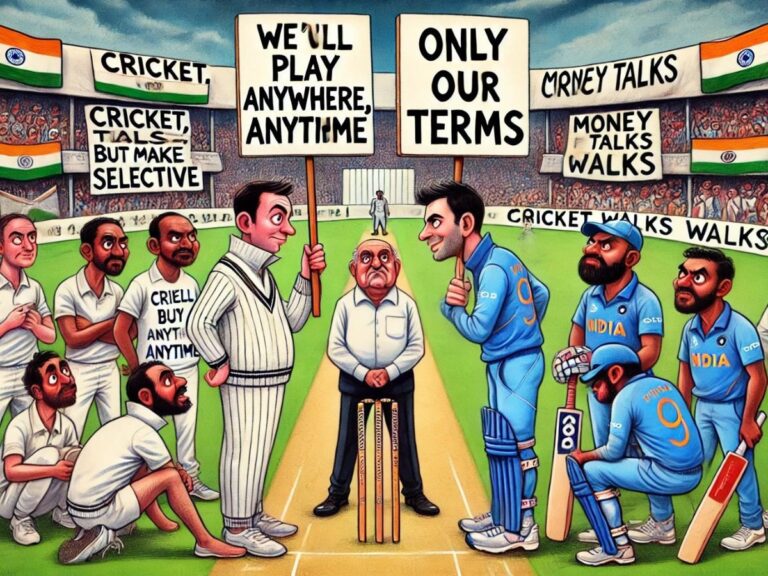Pat Cummins calls out India for selectively choosing where to play, questioning fairness and global cricket integrity.
Cricket is a game built on competition, sportsmanship, and the idea that teams should be ready to play anywhere, anytime. But lately, Australian captain Pat Cummins has called out India for what he sees as a troubling trend—choosing when and where they want to play international cricket.
His frustration isn’t just about one series or one decision; it’s about the bigger picture of fairness in the sport.
India’s Influence on Global Cricket
There’s no denying that India is the most powerful cricketing nation today. With the richest cricket board (BCCI), the most lucrative league (IPL), and the biggest fan base, India controls much of the sport’s financial and administrative landscape.
This influence is a double-edged sword. While it has helped grow the game globally, it has also led to accusations that India gets to dictate terms that other nations wouldn’t get away with.
A key example is how India selectively decides which international events and bilateral series it will participate in. A glaring issue is its long-standing refusal to play Pakistan in bilateral series due to political tensions. While security concerns are a valid reason in some cases, India has been willing to play in other countries that have faced similar risks.
This raises questions about consistency and whether these decisions are always based purely on safety or if other factors—like political influence—play a role.
Pat Cummins’ Concerns: Is He Right?
Cummins’ frustration isn’t just about India’s refusal to play Pakistan; it’s about a broader concern that a major team should not have the luxury of picking and choosing where they play.
He comes from an Australian cricket culture that believes teams should be ready to play in all conditions—whether it’s the swinging pitches of England, the spinning tracks of India, or the bouncy wickets of Australia.
If a country like India refuses to travel to certain locations while expecting other teams to play on their home turf without question, it creates an unfair playing field.
What happens if other teams start doing the same? If England decides they don’t want to tour certain countries? If Australia picks and chooses which conditions suit them best?
Cricket thrives on global competition, and this kind of selective participation threatens to weaken that spirit.
The India-Pakistan Factor & Political Influence
One of the most high-profile cases of India’s selective approach is its refusal to play bilateral series against Pakistan. The last time the two teams faced off outside ICC tournaments was in 2012.
Yet, when it comes to ICC events, they do play—because those tournaments bring in enormous revenue.
In 2023, India refused to play the Asia Cup in Pakistan, leading to a ‘hybrid model’ where matches were moved to Sri Lanka.
But this raised eyebrows, as India had no problem playing in Sri Lanka despite security concerns being cited for not playing in Pakistan.
While it’s understandable that India and Pakistan have political tensions, using cricket as a tool in that conflict isn’t ideal for the sport.
Cricket has historically been a bridge between nations, and many believe that playing bilateral series could help ease relations rather than worsen them.
The BCCI’s Power and ICC’s Weakness The real problem is that no one seems to be able to challenge India’s approach—not even the International Cricket Council (ICC).
The reason is simple: money. India generates the most revenue for global cricket, and the ICC heavily relies on it. If India refuses to play somewhere, the ICC hesitates to enforce rules because losing India’s participation means losing millions in revenue.
This financial dominance has led to an imbalance where India can make decisions based on its preferences, while smaller cricketing nations have no such power.
Many teams—especially those from less financially strong cricket boards—would never be able to dictate where and when they play.
How This Affects the Future of Cricket
India’s approach could have serious long-term consequences for international cricket. If this trend continues, other teams may start following suit, leading to a disjointed international calendar where teams only play where they want to.
This could reduce opportunities for smaller nations, weaken the importance of ICC tournaments, and prioritize financial interests over the game itself.
Additionally, with the rise of franchise cricket, international games are already facing competition.
If national teams start avoiding certain series or conditions, the appeal of international cricket could decline even further. It would be a major setback for the sport that thrives on global competition.
What Needs to Change?
The solution isn’t easy, but it starts with the ICC enforcing stricter participation rules. No team, no matter how powerful, should be allowed to pick and choose where they play without a legitimate reason.
Cricket boards should also come together to ensure a fair and balanced system where financial influence doesn’t dictate the game’s future.
Furthermore, while security concerns should always be taken seriously, they shouldn’t become a convenient excuse to avoid certain teams or venues.
If India, or any other nation, refuses to play in certain places, there should be a transparent and consistent policy explaining why.
Final Thoughts
Pat Cummins’ comments bring to light an uncomfortable truth: India’s selective approach to international cricket is damaging the game’s integrity.
While India is a powerhouse that contributes immensely to cricket’s global growth, with great power comes great responsibility. True champions play under all conditions, against all opponents, and without choosing only the easiest or most financially beneficial options.
If international cricket is to stay relevant, fairness must be upheld, and no team should be above the game itself.

